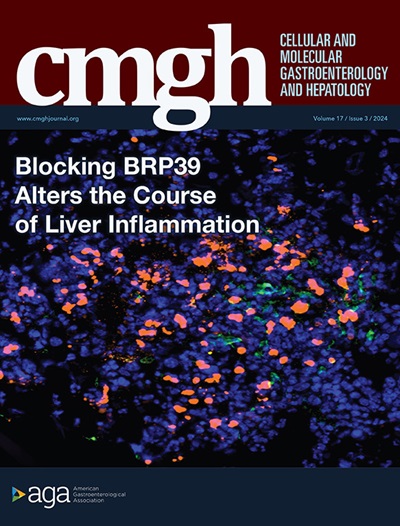Normalization of Cystic Fibrosis Immune System Reverses Intestinal Neutrophilic Inflammation and Significantly Improves the Survival of Cystic Fibrosis Mice
IF 7.1
1区 医学
Q1 GASTROENTEROLOGY & HEPATOLOGY
Cellular and Molecular Gastroenterology and Hepatology
Pub Date : 2025-01-01
DOI:10.1016/j.jcmgh.2024.101424
引用次数: 0
Abstract
Background & Aims
Cystic fibrosis (CF) is an autosomal recessive genetic disorder, affecting multiple organ systems. CF intestinal disease develops early, manifesting as intestinal bacterial overgrowth/dysbiosis, neutrophilic inflammation, and obstruction. As unresolvable infection and inflammation reflect host immune deficiency, we sought to determine if the CF-affected immune system plays any significant role in CF intestinal disease pathogenesis.
Methods
CF and sibling wild-type (WT) mice underwent reciprocal bone marrow transplantation. After immune reconstitution, their mortality, intestinal transit, fecal inflammatory markers, and mucosal immune cell composition were assessed. Moreover, reciprocal neutrophil transfusion was conducted to determine if neutrophil function affects intestinal movement. Furthermore, expression of induced nitric oxide synthase (iNOS) and production of nitric oxide (NO) in CF and WT neutrophils were compared. Lastly, specific iNOS inhibitor 1400W was tested to prevent CF intestinal obstruction.
Results
Immune restoration in CF mice reversed the intestinal neutrophilic inflammation, improved the intestinal dysmotility, and rescued the mice from mortality. Transfusion of WT neutrophils into CF mice ameliorated the retarded bowel movement. CF neutrophils expressed significantly more iNOS and produced significantly more NO. Pharmaceutical blocking of iNOS significantly improved intestinal transit and survival of CF mice.
Conclusions
CF immune defect plays a critical role in CF intestinal disease development. Activation of iNOS in inflammatory cells produces excessive NO, slows the bowel movement, and facilitates intestinal paralysis and obstruction in CF. Thus, normalization of the CF immune system may offer a novel therapy to treat CF intestinal disease.

CF免疫系统正常化可逆转肠道中性粒细胞炎症并显著提高CF小鼠的存活率
背景与目的:囊性纤维化(CF)是一种常染色体隐性遗传疾病,影响多个器官系统。CF肠道疾病发病较早,表现为肠道细菌过度生长/菌群失调、中性粒细胞炎症和阻塞。由于无法解决的感染和炎症反映了宿主免疫缺陷,我们试图确定受CF影响的免疫系统在CF肠道疾病发病机制中是否扮演重要角色:方法:CF 小鼠和同胞野生型(WT)小鼠进行了骨髓相互移植。方法:CF 小鼠和同胞野生型(WT)小鼠接受了互补骨髓移植,免疫重建后,对它们的死亡率、肠道转运、粪便炎症标志物和粘膜免疫细胞组成进行了评估。此外,还进行了中性粒细胞相互输血,以确定中性粒细胞功能是否会影响肠道运动。此外,还比较了CF和WT中性粒细胞中诱导一氧化氮合酶(iNOS)的表达和一氧化氮(NO)的产生。最后,测试了特异性 iNOS 抑制剂 1400W 对预防 CF 肠梗阻的作用:结果:CF小鼠的免疫恢复逆转了肠道中性粒细胞炎症,改善了肠道运动障碍,并使小鼠免于死亡。向CF小鼠输注WT中性粒细胞可改善肠道运动迟缓。CF 中性粒细胞表达的 iNOS 明显更多,产生的 NO 也明显更多。药物阻断 iNOS 能明显改善 CF 小鼠的肠蠕动和存活率:结论:CF 免疫缺陷在 CF 肠道疾病的发展中起着关键作用。结论:CF 免疫缺陷在 CF 肠道疾病的发生发展中起着关键作用。炎症细胞中的 iNOS 被激活后会产生过量的 NO,从而减缓肠道蠕动,促进 CF 肠道麻痹和阻塞。因此,使 CF 免疫系统恢复正常可能是治疗 CF 肠道疾病的一种新疗法。
本文章由计算机程序翻译,如有差异,请以英文原文为准。
求助全文
约1分钟内获得全文
求助全文
来源期刊

Cellular and Molecular Gastroenterology and Hepatology
Medicine-Gastroenterology
CiteScore
13.00
自引率
2.80%
发文量
246
审稿时长
42 days
期刊介绍:
"Cell and Molecular Gastroenterology and Hepatology (CMGH)" is a journal dedicated to advancing the understanding of digestive biology through impactful research that spans the spectrum of normal gastrointestinal, hepatic, and pancreatic functions, as well as their pathologies. The journal's mission is to publish high-quality, hypothesis-driven studies that offer mechanistic novelty and are methodologically robust, covering a wide range of themes in gastroenterology, hepatology, and pancreatology.
CMGH reports on the latest scientific advances in cell biology, immunology, physiology, microbiology, genetics, and neurobiology related to gastrointestinal, hepatobiliary, and pancreatic health and disease. The research published in CMGH is designed to address significant questions in the field, utilizing a variety of experimental approaches, including in vitro models, patient-derived tissues or cells, and animal models. This multifaceted approach enables the journal to contribute to both fundamental discoveries and their translation into clinical applications, ultimately aiming to improve patient care and treatment outcomes in digestive health.
 求助内容:
求助内容: 应助结果提醒方式:
应助结果提醒方式:


